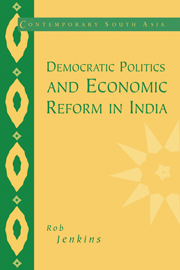Book contents
- Frontmatter
- Contents
- For M.S.J.
- Acknowledgements
- Map: States of the Indian federal union
- 1 Introduction
- 2 The evolution of economic reform in India
- 3 Theoretical and comparative perspectives on the politics of economic reform
- 4 Political incentives: elite perceptions and the calculus of survival
- 5 Political institutions: federalism, informal networks, and the management of dissent
- 6 Political skills: introducing reform by stealth
- 7 Implications
- Bibliography
- Index
7 - Implications
Published online by Cambridge University Press: 13 May 2010
- Frontmatter
- Contents
- For M.S.J.
- Acknowledgements
- Map: States of the Indian federal union
- 1 Introduction
- 2 The evolution of economic reform in India
- 3 Theoretical and comparative perspectives on the politics of economic reform
- 4 Political incentives: elite perceptions and the calculus of survival
- 5 Political institutions: federalism, informal networks, and the management of dissent
- 6 Political skills: introducing reform by stealth
- 7 Implications
- Bibliography
- Index
Summary
Rather than recapitulate the entire book in miniature, this chapter probes some of the unexplored implications of its main arguments. The aim is to identify additional questions arising from the explanation offered for why India has been able to sustain policy reform in the face of the political obstacles imposed by its democratic framework. This, it is hoped, may highlight some of the ways in which the findings of this study might inform future research. The first section considers the implications of this book's interpretation of the Indian case for the logic which underpins the good-government agenda. Particular emphasis is laid upon the shortcomings of what is currently the linchpin of this agenda – namely, the attempt of aid agencies to foster the emergence of ‘civil society’ in developing countries. The second section asks whether the means by which economic reform has been made politically sustainable in India may present problems for the implementation of future reforms, and for the health of democracy itself. The focus is on the extent to which the use of underhanded tactics during this first phase of reform may have seriously depleted India's institutional capital.
Before turning to these concerns, however, we must stress what this book is not arguing. The previous three chapters have attempted to demonstrate the crucial contribution of three features of India's democratic political system to making economic reform politically sustainable. Each has played a role in enabling change to take place, either by testing the boundaries of the possible or by altering perceptions among individuals and groups.
- Type
- Chapter
- Information
- Democratic Politics and Economic Reform in India , pp. 208 - 229Publisher: Cambridge University PressPrint publication year: 2000

